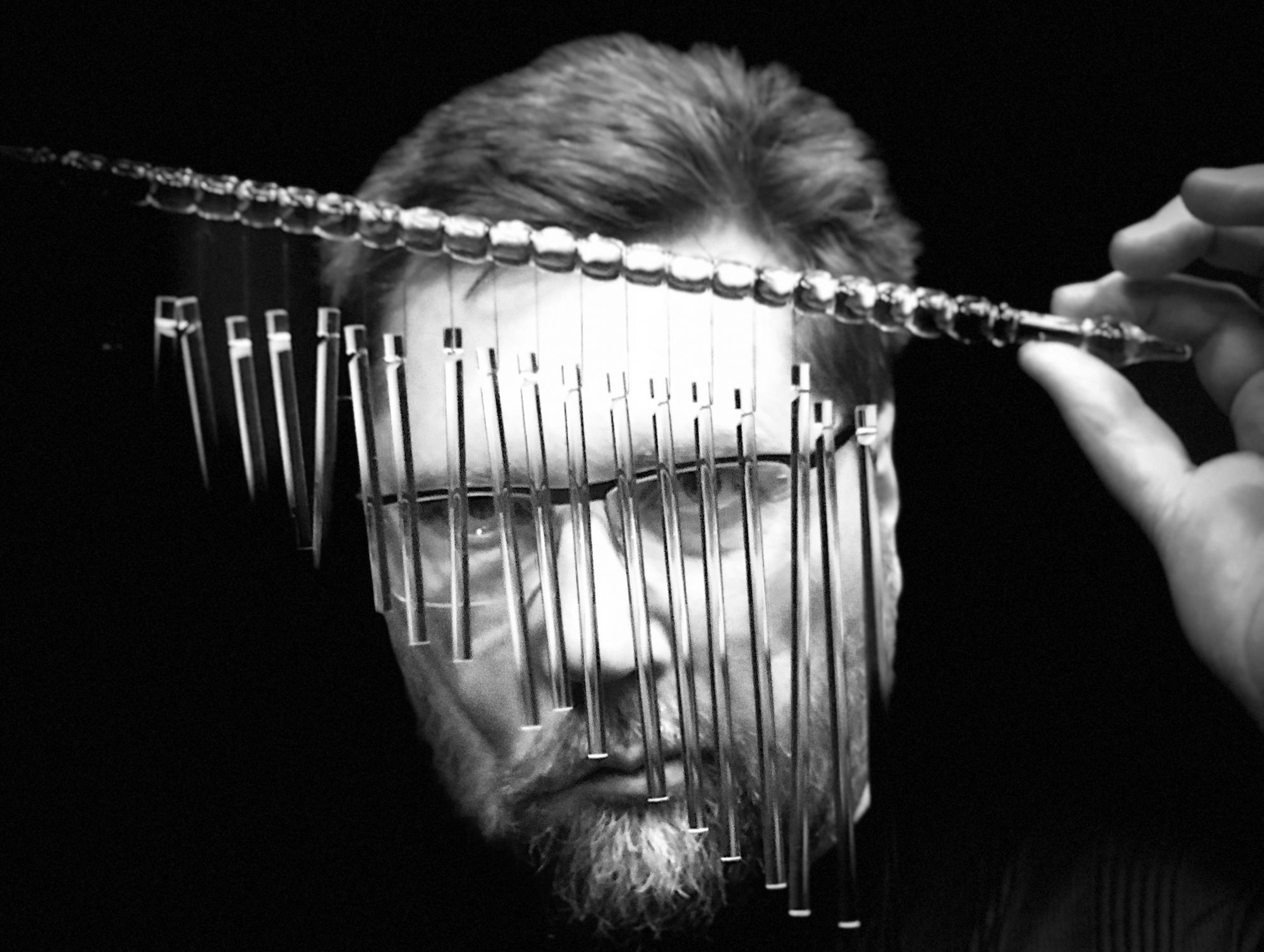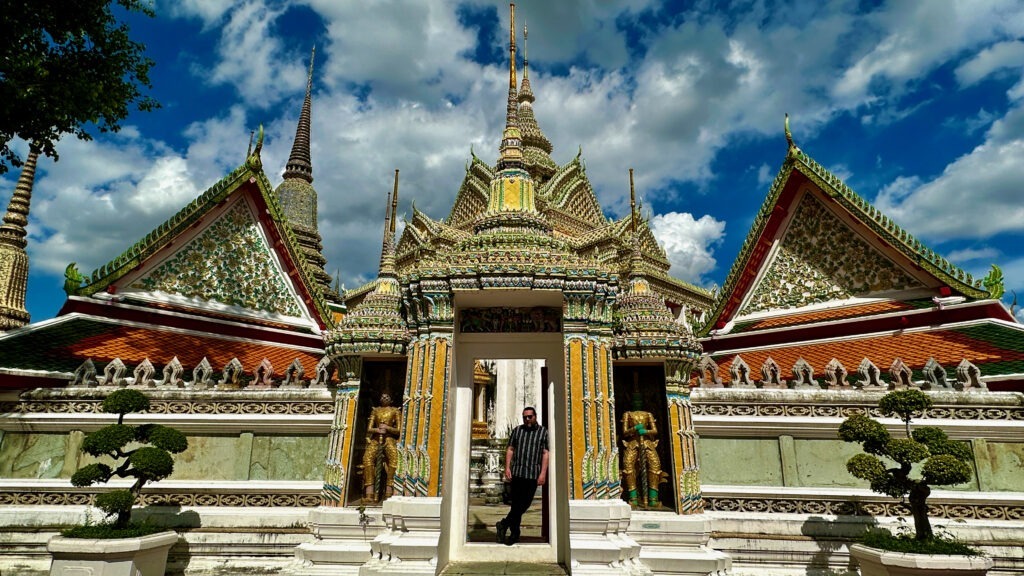
This summer I found myself in the Suvarnabhum Airport in Thailand, at the beginning of a 24-hour travel day back home from an amazing Percussion Festival in Bangkok. As I waited to check in, a story from the New Yorker by Agnes Callard popped up on my Facebook feed. As I was currently in the middle of a long journey, it caught my attention. In her article The Case Against Travel, Callard opined that travel “turns us into the worst version of ourselves while convincing us that we’re at our best.”
“Kind of cheeky” I thought, but after years as a traveling musician, I could sort of see her point. I have witnessed many instances where people exhibit the worst kind of entitled arrogant, and obnoxious behavior anytime there is even the slightest hiccup in their travel plans. I once overhead someone say, “I like to travel; I just don’t like all these foreigners.” [head tilt]
Shakespeare tells us that “the course of true love never did run smooth,” and the same may be said of travel. There are always delays missteps, and all manner of pitfalls for even the savviest sojourner. When that happens, many people will try to bully their way to a desired outcome—a technique that nearly always fails.
My approach to dealing with travel issues is to try and “kill them with kindness” to secure the outcome I want. Of course, there have been numerous occasions when even my syrupy-sweet charm hasn’t helped solve the problem. In that case you just “roll with the punches,” as a friend once advised me. Often though, I am the one who ends up with a hotel voucher or gets bumped up a class to the chagrin of the angry people in the line.
But I don’t think this is the case that Callard is making. She asks “what is the most uninformative statement that people are inclined to make? My nominee would be ‘I love to travel.’ This tells you very little about a person, because nearly everyone likes to travel; and yet people say it, because, for some reason, they pride themselves both on having travelled and on the fact that they look forward to doing so.”
To support her thesis, she enlists some heavy hitters who share her opinion including G.K. Chesterton, who wrote that “travel narrows the mind,” and Ralph Waldo Emerson who called travel “a fool’s paradise.” She even claims that philosophers Socrates and Kant rarely ventured from their respective hometowns of Athens and Königsberg.
Socrates asked “how can you wonder your travels do you no good, when you carry yourself around with you?” I think most people would interpret that as meaning we can’t escape our problems through travel because they are always within us, or more simply put; “wherever you go; there YOU are.” Besides, who would even want to travel any great distance in an Ox cart or on the back of a donkey?
“Wherever you go, there you are.” Socrates (sort of)
Let me stop here to say that travel isn’t the same thing as a vacation. It is a journey, and as such it is a tiring, arduous, unglamorous, and possibly dangerous undertaking. In many cases there is an implied purpose for such a trip. For me it is self-edification, and to also share what I’ve learned in this life about music with other interested people. If I’m being honest; I rather hate to travel. I enjoy being there but whenever I think about another twelve to fifteen hours in a cramped airplane eating terrible food, and navigating complex itineraries alongside grumpy people, I ask myself, “why am I doing this again?”
But it is Mark Twain who inspires me to, once again, get on that plane, train, boat, bus, taxi, Tuk Tuk, Wiki Wiki, or Buick LeSabre-with-no-back-seatbelts (welcome to China!). Twain wrote that “travel is fatal to prejudice, bigotry, and narrow-mindedness, and many of our people need it sorely on these accounts. Broad, wholesome, charitable views of men and things cannot be acquired by vegetating in one little corner of the earth all one’s lifetime.”
“Travel is fatal to prejudice, bigotry, and narrow-mindedness.” Twain
I firmly believe this to be true. You can learn a great deal about yourself when you are given the opportunity to see how others live. However, the challenge is in resisting the urge to apply your own standard of living to everyone you meet in every place you visit. Taking a comparative attitude of living conditions and lifestyles, or perhaps what Twain meant by “charitable views of men and things,” might keep you from seeing that most people are happy with their lives and proud of their home and country, and this is always good to experience in person.
Jack Kerouac I think said it best. “No matter how you travel, how ‘successful’ your tour, or foreshortened, you always earn something and learn to change your thoughts.” In some cases, taking the “charitable view” can also be a benefit when people in other parts of the world (or in your own backyard) are truly in need by any standard. Again, you can always “learn to change your thoughts.”
“No matter how you travel, how ‘successful’ your tour, or foreshortened, you always earn something and learn to change your thoughts.” Kerouac
But there is one common thread that I have experienced many times as a traveler: the aid and comfort of strangers. The experience that I remember most vividly was my first real trip outside the U.S. which took me to Japan in 1990. I was travelling to Kumamoto to perform with a college big band at the invitation of a friend and former student. We were going to play several gigs with a variety of local musicians, so I was traveling with all my own electronic mallet percussion instruments in a large rolling trap case (one that would not go anywhere near a plane today).
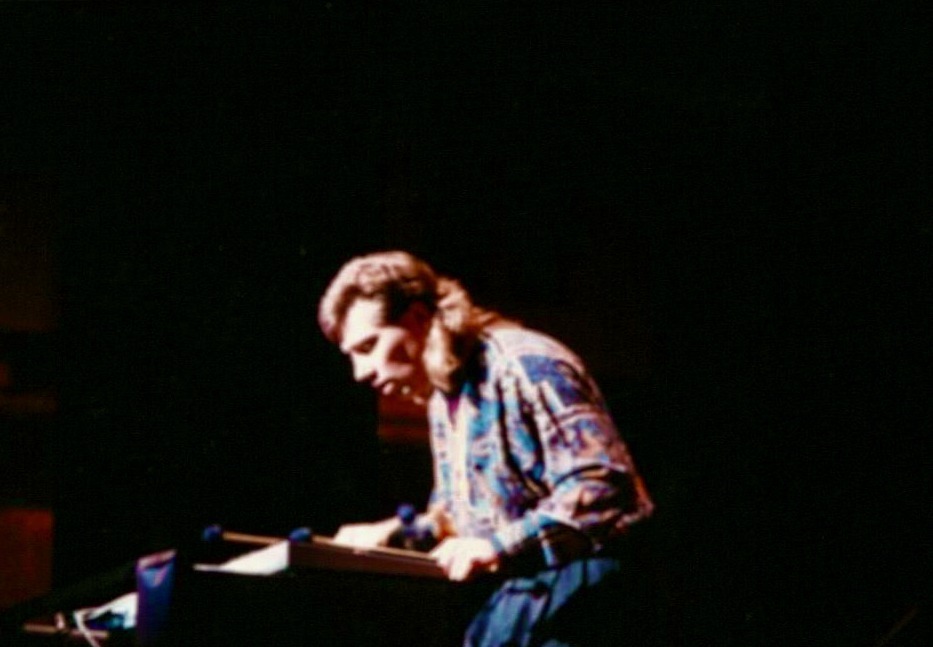
The trip took me first to Osaka where my connecting flight to Kumamoto was cancelled. At that point I was completely adrift with no plan for the night. I had wandered the airport for hours looking for a place to make a nest and sit and wait until my flight the next day. It was late and I was tired when I learned that I couldn’t stay in the airport overnight in Osaka. I needed to find a corner to stash my giant trap case and then exit the terminal until morning (imagine such a scenario today).
I was standing near the temporary lockers, head down and lost in thought when I heard a voice ask, “tough day?” Looking up I see a Japanese gentleman also putting his things into a locker. “Yeah” I replied in a daze. He was the first person I had heard speaking English all day. He replied, “Yeah, me too. My flight got cancelled. What are you gonna do?” I said I didn’t know, so he told me that he was going to get a room in the airport hotel which was attached to the terminal, and he asked If I wanted to go there too. Trying to be cool, I said “sure, why not?” I was actually quite terrified. We went to the hotel together where I got a room that was so tiny that I had to leave the case behind the desk in the lobby because there was no floor space large enough for it in the room.
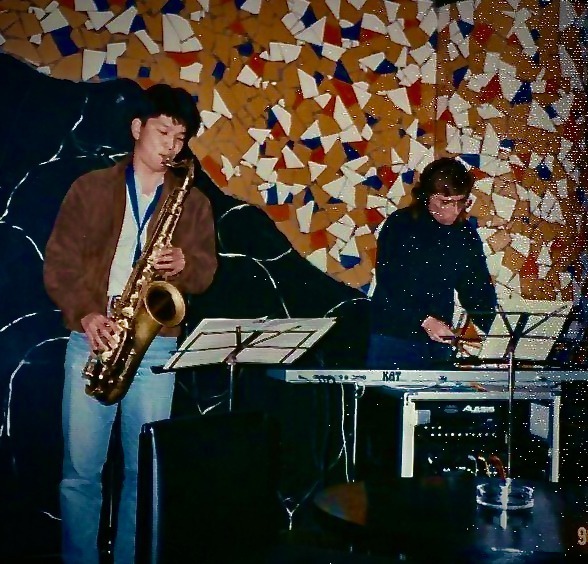
My new friend then asked if I wanted to get something to eat. Feeling bold I said of course, so we got a cab and ventured out into Osaka where we ate street food and got to know each other. He was a Japanese Ex patriot who owned a Japanese restaurant in Oakland, California and was coming home to see his dying mother. He hadn’t been in Japan for more than 20 years, so his Japanese was “a bit rusty.” One thing was sure, it was better than mine.
We enjoyed a warm evening eating hot soup and noodles from a street vendor, walking around, and talking. As we returned to the hotel, he gave me his business card and said if I was ever in Oakland, I should give him a call. I regret never reaching out to him after we got back to the states because he was my Strange Angel that night in Osaka.
It was this kind of comfort from a stranger that has given me hope for humanity on numerous occasions since. He was certainly my angel that night, but maybe I was his too. As we walked, he talked about his mother and how he regretted not coming home to see her more often now that it was maybe too late. Perhaps he could only say these things to a stranger. I don’t know.
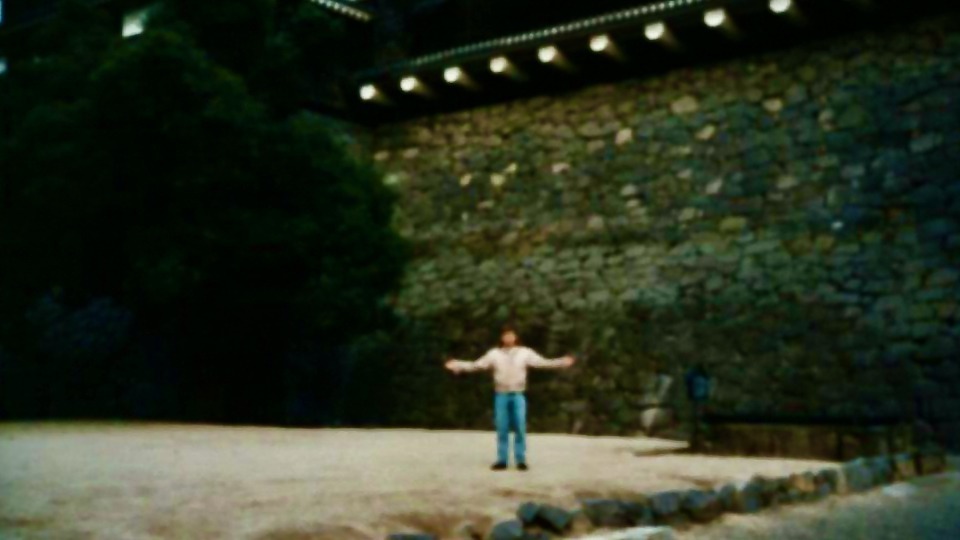
Now, some thirty years later, as we made our way through thousands of fellow travelers in the bustling Bangkok airport, we spotted three young Korean students who had also attended the festival. What a nice surprise. We were excited to see them and said a big hello but we could quickly tell they were nervous and a bit scared. We learned that the passport of one of the students was expiring within the week, and the airline wouldn’t let him get on the plane, even if he was going back home to Korea (strange, but such is the world today).
We stopped and tried to comfort them while one of the other students made arrangements for them on a different airline. By the time I got checked in they had booked another flight for the next day and my friends who were dropping me off, took them back to the hotel in Bangkok. For a moment I thought about my friend in Japan from so long ago and smiled at the thought that the comfort of strangers still prevails.
So, I guess I’ll continue to rely on the words of Jack Kerouac: “the road must eventually lead to the whole world,” which for me means that I will continue to love to hate to travel, and try to be the best version of myself along the way until I have seen as much of the whole world as I can.
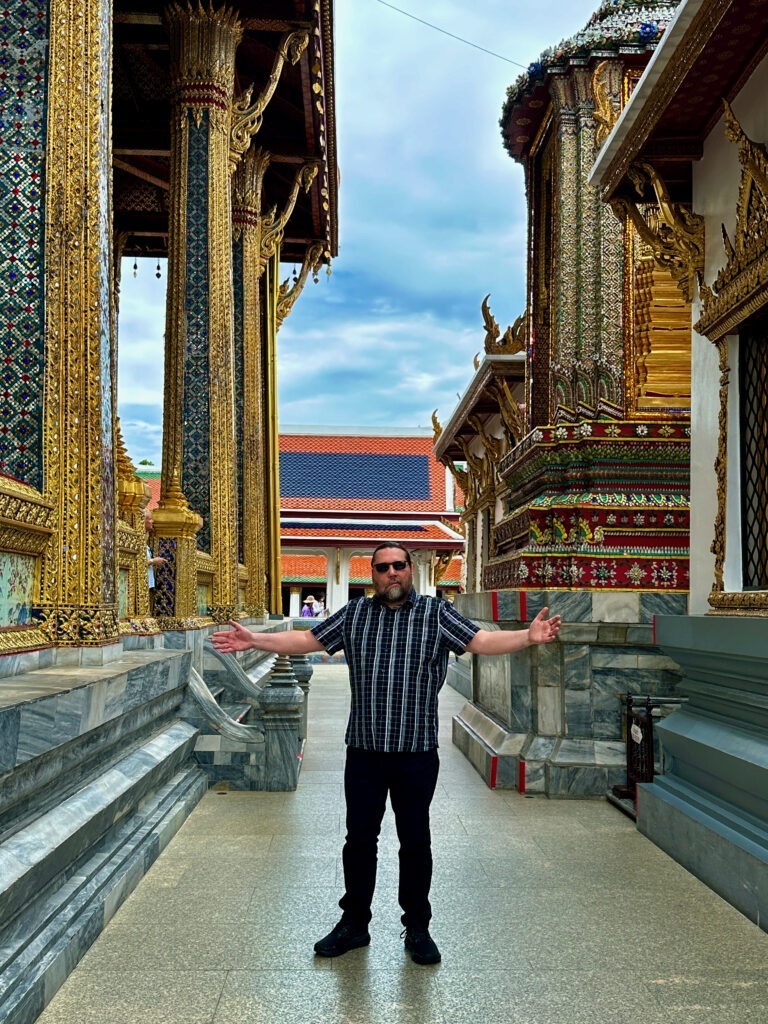
Citations:
Callard, Agnes, The Case Against Travel: It turns us into the worst version of ourselves while convincing us that we’re at our best. New Yorker Magazine Online, accessed July 24, 2023
Twain, Mark (Samuel Clemens), The Innocents Abroad, [1869—1st Edition], Project Gutenberg, The Innocents Abroad, Release Date: August 16, 2006 [EBook #3176]
Listening:
Dan Moore Plays the Phantom with the Cosmic Mind Jazz Orchestra in Japan 1990
Hanuman by Jinnawat Mansap performed by Iowa Percussion
Very cool music from Thai composer Jinnawat Mansap beautifully arranged for percussion ensemble by Tanasit Siripanichwattana. One of the perks of travel is finding new music.
A Parting Shot:
In a night club in Argentina, a young woman approached me wearing army boots and wildly-dyed hair (long before such trends were popular) and asked if I was an American, to which I responded a cheerful “yes.” Her next words were shouted emphatically over the sensuous sounds of Tango music; “I f#*%ing hate George Bush!” I had so many questions but since there didn’t seem to be any curiosity in her remark, I simply responded, “OK, I’m going to join my friends now…”
Mark Twain’s suggestion about travel might’ve been a benefit to this person but then again maybe not.
